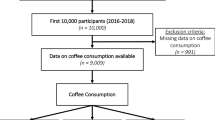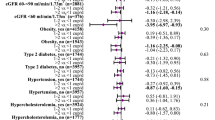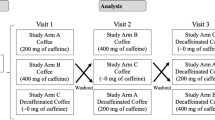Abstract
Background/Objectives:
Coffee is the most widely consumed beverage in the world, but its effect on the cardiovascular system has not been fully understood. Coffee contains caffeine and antioxidants, which may influence endothelial function, both of which have not yet been investigated. The objective of this study was to investigate the acute effects of coffee on endothelial function measured by brachial artery flow-mediated dilation (FMD).
Subjects/Methods:
A total of 20 (10 males and 10 females) healthy non-obese subjects underwent a double-blind, crossover study. Subjects ingested one cup of caffeinated (CC) and one cup of decaffeinated (DC) Italian espresso coffee in random order at 5- to 7-day intervals.
Results:
Following CC ingestion, FMD decreased progressively and significantly (mean±s.e.m.: 0 min, 7.7±0.6; 30 min, 6.3±0.7; 60 min, 6.0±0.8%; ANOVA (analysis of variance), P<0.05), but it did not significantly increase after DC ingestion (0 min, 6.9±0.6; 30 min, 8.1±0.9; 60 min, 8.5±0.9%; P=0.115). Similarly, CC significantly increased both systolic and diastolic blood pressure; this effect was not observed after DC ingestion. Blood glucose concentrations remained unchanged after ingestion of both CC and DC, but insulin (0 min, 15.8±0.9; 60 min, 15.0±0.8 μU/ml; P<0.05) and C-peptide (0 min, 1.25±0.09; 60 min, 1.18±0.09 ng/ml; P<0.01) blood concentrations decreased significantly only after CC ingestion.
Conclusions:
CC acutely induced unfavorable cardiovascular effects, especially on endothelial function. In the fasting state, insulin secretion is also likely reduced after CC ingestion. Future studies will determine whether CC has detrimental clinically relevant effects, especially in unhealthy subjects.
This is a preview of subscription content, access via your institution
Access options
Subscribe to this journal
Receive 12 print issues and online access
$259.00 per year
only $21.58 per issue
Buy this article
- Purchase on Springer Link
- Instant access to full article PDF
Prices may be subject to local taxes which are calculated during checkout

Similar content being viewed by others
References
Alexopoulos N, Vlachopoulos C, Aznaouridis K, Baou K, Vasiliadou C, Pietri P et al. (2008). The acute effect of green tea consumption on endothelial function in healthy individuals. Eur J Cardiovasc Prev Rehabil 15, 300–305.
Barac A, Campia U, Panza JA (2007). Methods for evaluating endothelial function in humans. Hypertension 49, 748–760.
Bonita JS, Mandarano M, Shuta D, Vinson J (2007). Coffee and cardiovascular disease: in vitro, cellular, animal, and human studies. Pharmacol Res 55, 187–198.
Buscemi S, Verga S, Batsis JA, Tranchina MR, Belmonte S, Mattina A et al. (2009a). Dose-dependent effects of decaffeinated coffee on endothelial function in healthy subjects. Eur J Clin Nutr 63, 1200–1205.
Buscemi S, Verga S, Tranchina MR, Cottone S, Cerasola G (2009b). Effects of hypocaloric very-low-carbohydrate diet vs Mediterranean diet on endothelial function in obese women. Eur J Clin Invest 39, 339–347.
Buus NH, Jørgensen CG, Mulvany MJ, Sørensen KE (2007). Large and small artery endothelial function in patients with essential hypertension—effect of ACE inhibition and beta-blockade. Blood Press 16, 106–113.
Casiglia E, Bongiovi S, Paleari CD, Petucco S, Boni M, Colangeli G et al. (1991). Haemodynamic effects of coffee and caffeine in normal volunteers: a placebo-controlled clinical study. J Intern Med 229, 501–504.
Cornelis MC, El-Sohemy A, Kabagambe EK, Campos H (2006). Coffee, CYP1A2 genotype, and risk of myocardial infarction. JAMA 295, 1135–1141.
Corretti MC, Anderson TJ, Benjamin EJ, Celermajer D, Charbonneau F, Creager MA et al. (2002). Guidelines for the ultrasound assessment of endothelial-dependent flow-mediated vasodilation of the brachial artery. J Am Coll Cardiol 39, 257–265.
Corti R, Binggeli C, Sudano I, Spieker L, Hänseler E, Ruschitzka F et al. (2002). Coffee acutely increases sympathetic nerve activity and blood pressure independently of caffeine content. Role of habitual versus nonhabitual drinking. Circulation 106, 2935–2940.
Daglia M, Papetti A, Gregotti C, Berte F, Gazzani G (2000). In vitro antioxidant and ex vivo protective activities of green and roasted coffee. J Agric Food Chem 48, 1449–1454.
Deanfield JE, Halcox JP, Rabelink TJ (2007). Endothelial function and dysfunction. Testing and clinical relevance. Circulation 115, 1285–1295.
Duffy SJ, Keaney JF, Holbrook M, Gokce N, Swerdloff PL, Frei B et al. (2001). Short- and long-term black tea consumption reverses endothelial dysfunction in patients with coronary artery disease. Circulation 104, 151–156.
Esposito K, Nappo F, Giugliano F, Giugliano G, Marfella R, Giugliano D (2003). Effect of diaetary antioxidants on postprandial endothelial dysfunction induced by a high-fat meal in healthy subjects. Am J Clin Nutr 77, 139–143.
Frary CD, Johnson RK, Wang MQ (2005). Food sources and intakes of caffeine in the diets of persons in the United States. J Am Diet Assoc 105, 110–113.
Friedewald WT (1972). Estimation of the concentration of low density lipoprotein cholesterol in plasma, without use of the preparative ultracentrifuge. Clin Chem 18, 499–502.
Fuchgott RF, Zawadzki JV (1980). The obligatory role of endothelial cells in the relaxation of arterial smooth muscle by acetylcholine. Nature 288, 373–376.
Fujioka K, Shibamoto T (2008). Chlorogenic acid and caffeine contents in various commercial brewed coffees. Food Chem 106, 217–221.
Gokce N, Keaney JF, Hunter LM, Watkins MT, Menzoian JO, Vita JA (2002). Risk stratification for postoperative cardiovascular events via noninvasive assessment of endothelial function. Circulation 105, 1567–1572.
Grassi D, Desideri G, Necozione S, Lippi C, Casale R, Properzi G et al. (2008). Blood pressure is reduced and insulin sensitivity increased in glucose-intolerant, hypertensive subjects after 15 days of consuming high-polyphenol dark chocolate. J Nutr 138, 1671–1676.
Greenberg JA, Boozer CN, Geliebter A (2006). Coffee, diabetes, and weight control. Am J Clin Nutr 84, 682–693.
Hamdy O, Ledbury S, Mullooly C, Jarema C, Porter S, Ovalle K et al. (2003). Lifestyle modification improves endothelial function in obese subjects with the insulin resistance syndrome. Diabetes Care 26, 2119–2125.
Keogh JB, Grieger JA, Noakes M, Clifton PM (2005). Flow-mediated dilation is impaired by a high-saturated fat diet but not by a high-carbohydrate diet. Arterioscler Thromb Vasc Biol 25, 1274–1279.
Kitta Y, Obata JE, Nakamura T, Hirano M, Kodama Y, Fujioka D et al. (2009). Persistent impairment of endothelial vasomotor function has a negative impact on outcome in patients with coronary artery disease. J Am Coll Cardiol 53, 323–330.
Klatsky AL, Koplik S, Kipp H, Friedman GD (2008). The confounded relation of coffee drinking to coronary artery disease. Am J Cardiol 101, 825–827.
Lane JD, Feinglos MN, Surwit RS (2008). Caffeine increases ambulatory glucose and postprandial responses in coffee drinkers with type 2 diabetes. Diabetes Care 31, 221–222.
Larsson SC, Männistö S, Virtanen MJ, Kontto J, Albanes D, Virtamo J (2008). Coffee and tea consumption and risk of stroke subtypes in male smokers. Stroke 39, 1681–1687.
Libby P, Ridker PM, Maseri A (2002). Inflammation and atherosclerosis. Circulation 105, 1135–1143.
Lopez-Garcia E, van Dam RM, Qi L, Hu FB (2006). Coffee consumption and markers of inflammation and endothelial dysfunction in healthy and diabetic women. Am J Clin Nutr 84, 888–893.
Mahmud A, Feely J (2001). Acute effect of caffeine on arterial stiffness and aortic pressure waveform. Hypertension 38, 227–231.
Mäki-Petäjä KM, Booth AD, Hall FC, Wallace SML, Brown J, McEniery CM et al. (2007). Ezetimibe and Simvastatin reduce inflammation, disease activity, and aortic stiffness and improve endothelial function in rheumatoid arthritis. J Am Coll Cardiol 50, 852–858.
Matthews DR, Hosker JP, Rudenski AS, Naylor BA, Treacher DF, Turner RC (1985). Homeostasis model assessment: insulin resistance and β-cell function from fasting plasma glucose and insulin concentrations in man. Diabetologia 28, 412–419.
Moens AL, Goovaerts I, Claeys MJ, Vrints CJ (2005). Flow-mediated vasodilation. Chest 127, 2254–2263.
Moisey LL, Kacker S, Bickerton AC, Robinson LE, Graham TE (2008). Caffeinated coffee consumption impairs blood glucose homeostasis in response to high and low glycemic index meals in healthy men. Am J Clin Nutr 87, 1254–1261.
Nurminen ML, Nittynen L, Korpela R, Vapaatalo H (1999). Coffee, caffeine and blood pressure: a critical review. Eur J Clin Nutr 53, 891–899.
Odegaard AO, Pereira MA, Koh WP, Arakawa K, Lee HP, Yu MC (2008). Coffee, tea and incident type 2 diabetes: the Singapore chinese health study. Am J Clin Nutr 88, 979–985.
Papamichael CM, Aznaouridis KA, Karatzis EN, Karatzi KN, Stamatelopoulos KS, Vamvakou G et al. (2005). Effect of coffee on endothelial function in healthy subjects: the role of caffeine. Clin Sci 109, 55–60.
Riksen NP, Rongen GA, Smits P (2009). Acute and long-term cardiovascular effects of coffee: implications for coronary heart disease. Pharmacol Ter 121, 185–191.
Rossi R, Nuzzo A, Origliani G, Modena MG (2008). Prognostic role of flow-mediated and cardiac risk factors in post-menopausal women. J Am Coll Cardiol 51, 997–1002.
Shimabukuro M, Chinen I, Higa N, Takasu N, Yamakawa K, Ueda S (2007). Effects of dietary composition on postprandial endothelial function and adiponectin concentrations in healthy humans: a crossover controlled study. Am J Clin Nutr 86, 923–928.
Silletta MG, Marfisi R, Levantesi G, Boccanelli A, Chieffo C, Franzosi M et al. (2007). Coffee consumption and risk of cardiovascular events after acute myocardial infarction. Circulation 116, 2944–2951.
Suzuki A, Yamamoto N, Jokura H, Yamamoto M, Fujii A, Tokimitsu I et al. (2006). Chlorogenic acid attenuates hypertension and improves endothelial function in spontaneously hypertensive rats. J Hypertens 24, 1065–1073.
Van Dam RM, Hu FB (2008). Coffee consumption and risk of type 2 diabetes. A systematic review. JAMA 294, 97–104.
van Woundenbergh GJ, Vliegenthart R, van Rooij FJ, Hofman A, Oudkerk M, Witteman JC et al. (2008). Coffee consumption and coronary calcification: the Rotterdam Coronary Calcification Study. Arterioscler Thromb Vasc Biol 28, 1018–1023.
Verga S, Buscemi S, Caimi G (1994). Resting energy expenditure and body composition in morbidly obese, obese and control subjects. Acta Diabetol 31, 47–51.
Vogel RA, Corretti MC, Plotnick GD (2000). The postprandial effect of component of the Mediterranean diet on endothelial function. J Am Coll Cardiol 36, 1455–1460.
Whitsett TL, Manion CV, Christensen HD (1984). Cardiovascular effects of coffee and caffeine. Am J Cardiol 53, 918–922.
Widlansky ME, Gokce N, Keaney JF, Vita JF (2003). The clinical implications of endothelial function. J Am Coll Cardiol 42, 1149–1160.
Wu G, Meininger CJ (2002). Regulation of nitric oxide synthesis by dietary factors. Ann Rev Nutr 22, 61–86.
Yeboah J, Crouse JR, Hsu FC, Burke GL, Herrington DM (2007). Brachial flow-mediated dilation predicts incident cardiovascular events in older adults: the cardiovascular health study. Circulation 115, 2390–2397.
Zampelas A, Panagiotakos DB, Pitsavos C, Chrysohoou C, Stefanadis C (2004). Associations between coffee consumption and inflammatory markers in healthy persons: the ATTICA Study. Am J Clin Nutr 80, 862–867.
Acknowledgements
This study was supported in part by the Italian Ministry of Education (ex 60% funds, 2007) and by the Associazione Onlus Nutrizione e Salute, Italy. The authors are gratefully indebted to the voluntary subjects who participated in the study and to Giovanna Seddio and Giovanni De Canzio for their invaluable technical support in the laboratory work.
Author information
Authors and Affiliations
Corresponding author
Ethics declarations
Competing interests
The authors declare no conflict of interest.
Additional information
Contributors: SB contributed to the experimental design, performed the FMD measurements, interpreted data, drafted the manuscript and performed the statistical analysis. SV contributed to the experimental design, data interpretation and the writing of the manuscript. JAB contributed to the interpretation of the data, critical revision of the manuscript and final approval of the submitted manuscript. MD supervised the hormonal and other laboratory blood measurements and contributed to data interpretation. MRT, SB, AM and GP recruited participants and performed data collection and analysis. GC contributed to the experimental design, data interpretation, writing of the manuscript and trial coordination and had overall responsibility for the study.
Rights and permissions
About this article
Cite this article
Buscemi, S., Verga, S., Batsis, J. et al. Acute effects of coffee on endothelial function in healthy subjects. Eur J Clin Nutr 64, 483–489 (2010). https://doi.org/10.1038/ejcn.2010.9
Received:
Revised:
Accepted:
Published:
Issue Date:
DOI: https://doi.org/10.1038/ejcn.2010.9
Keywords
This article is cited by
-
Acute Effects of Coffee Consumption on Blood Pressure and Endothelial Function in Individuals with Hypertension on Antihypertensive Drug Treatment: A Randomized Crossover Trial
High Blood Pressure & Cardiovascular Prevention (2024)
-
A moderate dosage of coffee causes acute retinal capillary perfusion decrease in healthy young individuals
BMC Ophthalmology (2022)
-
The effects of green coffee extract supplementation on glycemic indices and lipid profile in adults: a systematic review and dose-response meta-analysis of clinical trials
Nutrition Journal (2020)
-
Moderate consumption of a soluble green/roasted coffee rich in caffeoylquinic acids reduces cardiovascular risk markers: results from a randomized, cross-over, controlled trial in healthy and hypercholesterolemic subjects
European Journal of Nutrition (2019)
-
Coffee with a high content of chlorogenic acids and low content of hydroxyhydroquinone improves postprandial endothelial dysfunction in patients with borderline and stage 1 hypertension
European Journal of Nutrition (2019)



